Al-Zaytouna Centre for Studies and Consultations, as part of its ongoing commitment to analyze and evaluate strategic developments concerning the Palestine issue and anticipate its future trajectories, organized on 22/5/2024, a panel discussion titled “The Future Impact of Operation al-Aqsa Flood and the Israeli War on Gaza Strip on International Attitudes Toward Israel and the Palestine Issue,” attended by a distinguished group of researchers and experts in Palestinian affairs and regional dynamics.
Al-Zaytouna General-Manager, Prof. Dr. Mohsen Mohammed Saleh moderated the panel discussion featuring the presentation of five working papers. Dr. ‘Abbas Ism‘ail, expert in Israeli affairs, initiated the discussions by providing an overview of the Israeli conditions. He noted the significant international support for Israel and asserted that the implicit aim of the Israeli war on Gaza Strip (GS) was to displace Palestinians from the strip. He highlighted that the prolonged duration of the war and the failure to achieve Israeli objectives, coupled with resulting massacres, spurred an effective international response. Key international actions included initiatives by the South African movement in the International Court of Justice (ICJ), proceedings in the International Criminal Court (ICC), and global university campaigns and marches. Ism‘ail underscored the substantial damage inflicted on the Israeli narrative.
Ism‘ail noted that Israel has consolidated its political messaging to address these challenges and has initiated both local and international media and propaganda campaigns to further its agenda. Conversely, a cadre of experts has voiced apprehension regarding the unfolding events, as they directly impinge upon Israel’s existence. Some experts opined that the strategic shifts signify the shortcomings of the Israeli government and Netanyahu. They argue that for Israel to effectively combat Hamas, it must regain international support. One of the pivotal means to achieve this is by alleviating the humanitarian crisis in GS. Additionally, certain experts cautioned that Israel’s potential resolution to the crisis might entail accepting the proposal for a Palestinian state, stressing the necessity for Israel to persuade the United States of the perils associated with this notion.
Dr. Hossam Matar, a researcher specializing in international relations, presented the second paper. He stated that at the onset of the war, the US stance aimed to achieve several objectives: securing a military victory in GS, ousting Hamas from power, disarming the movement, reinstating the Palestinian Authority’s (PA’s) control over GS, and reinvigorating the path towards a two-state solution and normalization, particularly with Saudi Arabia. Additionally, the US position sought to prevent widespread regional escalation, manage the humanitarian fallout from the war, safeguard allied regimes from destabilization, notably in Jordan and Egypt, and prevent Russia and China from exploiting the situation to assert control over the region or undermine the legitimacy of the international system in the area. Consequently, the US concluded that the central conflict lay in the Palestinian-Israeli dispute rather than with Iran. It emphasized that resolving the conflict necessitates a political framework based on mutual interests, asserting that normalization hinges on resolving the Palestinian-Israeli issue, and stressing that Israeli security requires a regional approach.
Matar believes that if the US fails to initiate the political track, it would lead to a significant failure, potentially impacting Biden’s prospects in the US elections. Consequently, the US aims to contemplate Gaza’s future, discuss normalization with Saudi Arabia, and exert pressure on Netanyahu and Hamas to advance this trajectory. Alternatively, it may opt to quell the war temporarily until after the US elections, potentially through a ceasefire, humanitarian aid or a prisoner exchange.
The third paper was delivered by Prof. Dr. Walid ‘Abd al-Hay, an expert in futures studies. He outlined two frameworks for crafting strategies in major countries. The first involves seeking a favorable position within the global polar system, with all the associated benefits. The second entails assessing the value of each geostrategic region worldwide and allocating attention accordingly, based on its significance within the major state’s strategic objectives in the polar system pursuit. He noted that the Russian strategy primarily centers on military-security objectives, indicating that Russia’s perspective on the Middle East is fundamentally geostrategic and defensive. Conversely, the Chinese strategy is characterized by mercantilism and a perception of international relations as non-zero-sum, suggesting a gradual departure from ideological rigidity. Thus, the Chinese perceptions of the Middle East emphasize its role as a high-potential market and a significant energy source. Therefore, the Chinese approach to assessing Middle Eastern developments hinges on their impact on trade volume, oil flow and prices, and China’s Belt and Road Initiative (BRI).
‘Abd al-Hay added that Operation Al-Aqsa Flood has placed the Russian-Iranian relationship at a crossroads. While Iran stands as Russia’s strongest ally in the Middle East, it also serves as the focal point of the Axis of Resistance. It appears that Russia gains more from Operation Al-Aqsa Flood than Iran and the Axis of Resistance do.
‘Abd al-Hay suggested that China appears less willing than Russia to escalate the war on GS to a regional scale. This reluctance stems from the significant potential damage to China, including trade disruption with the region, increased oil prices and hindrance to the BRI’s development. He highlighted that China and Russia have shared several stances, such as abstaining from mediating between the resistance and Israel. Both countries have capitalized on the exposure of double standards within the Western value system, rendering its application against either country less effective than previously.
The fourth paper was delivered by Hossam Shaker, an expert in European and international affairs. He noted that Europe initially hastened to legitimize the war and Israel’s claim to self-defense. However, following the Israel’s inability, the resilience of the Palestinian people, and the exposure of Israeli war crimes, Europe retreated and began seeking a path to negotiation. He further highlighted that Europe is closely monitoring the US elections, noting that a return to power by Trump would likely impact how the region is managed, particularly in the face of ongoing war. Unlike Trump, Biden’s approach is not as adversarial to Europe.
The fifth paper was presented by Luna AbuSwaireh, Director-General of the Center for Arab Unity Studies. She emphasized that we are currently witnessing one of the most significant battles in history, characterized by a clash of ideologies. On one side, there’s Zionism and its Western allies advocating for colonialism and hegemony, while on the other, there’s Palestine along with its resistance movements and liberation forces worldwide. AbuSwaireh noted the failure of Arab unity in countering Israel’s racist rhetoric, but highlighted the solidarity of nations liberated from colonial rule in supporting Palestine. She underscored that historically marginalized and oppressed peoples, accustomed to enduring tragedies with resignation, are now actively engaged, while recognizing the urgency of the situation. This moment, she argued, is akin to a transformative and revealing flood, prompting action rather than passive observation.
AbuSwaireh emphasized the need to initiate a diplomatic campaign aimed at officially categorizing Zionism as a racist movement within the United Nations, international academic institutions, and protest forums. Additionally, she advocated for supporting the suspension or freeze of Israel’s UN membership. She further asserted that Zionism is destined to crumble, emphasizing the importance of accumulating victories through grassroots efforts. AbuSwaireh called for collaboration and the formation of a broad international coalition comprising academics, students and civil society activists to persistently advocate for the liberation of Palestine.
Significant interventions and comments were made by a group of experts and specialists regarding the papers presented. The session concluded with the presenters addressing questions and remarks from the discussants, providing answers and clarifications.



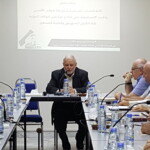
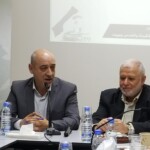
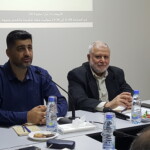
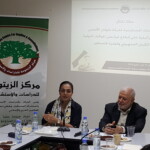
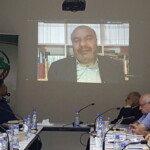
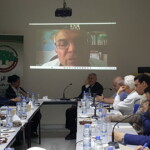
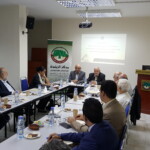
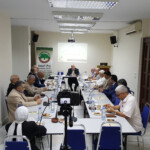

Leave A Comment